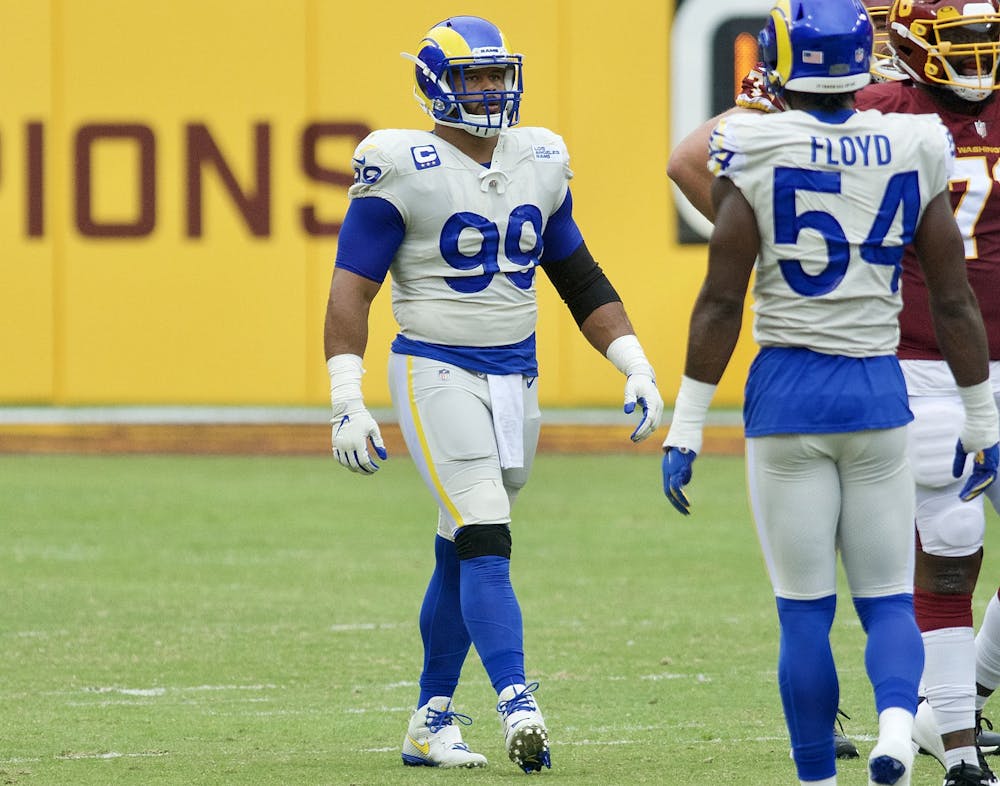Los Angeles Rams defensive tackle Aaron Donald won his third NFL Defensive Player of the Year (DPOY) Award this season. But right after he won, J.J. Watt, also a three-time DPOY, and many others took to social media to advocate for his younger brother, Pittsburgh Steelers outside linebacker T.J. Watt.
Don’t get me wrong; the younger Watt is a really good player. Maybe even a great player. If you look at the box score stats alone, he had an amazing case. T.J. Watt had a high number of sacks, pressures, tackles and a bunch of other typical stats that defensive linemen are valued on.
So why did Donald win DPOY if he was statistically worse in a lot of categories compared to T.J. Watt? Are the voters a bunch of frauds with a clear bias towards the Rams defensive tackle?
Let’s look a little bit closer. First of all, Donald and T.J. Watt play different positions on the defensive line. As a tackle, Donald plays more in the middle, and T.J. Watt, as an outside linebacker, plays further outside.
Typically, outside linebackers and other defenders who play along the edge of the line have much higher pass-rushing stats than tackles on the inside. This is because on the outside of the line, defenders are able to run both around and through the offensive linemen, so they generally have more variability in how they can pass-rush to generate sacks and pressures.
Furthermore, when an offense wants to double-team an edge defender like T.J. Watt, they will have a tight end or a running back help the one offensive lineman by chipping the defender. This usually means there is one mountain of a man, the offensive lineman, and another, smaller player assisting against T.J. Watt when he is double-teamed. However, T.J. Watt plays on one of the best defensive lines in the NFL, so offenses simply do not have the resources to actually double-team him every play. In fact, T.J. Watt gets double-teamed only around 15% of the time.
Now how is defensive tackle a different position? Well, as mentioned before, they play closer to the middle of the line, so that immediately cuts down on the amount of moves a tackle can do to get past an offensive line.
On top of that, when a defensive tackle is double-teamed, they go against two offensive linemen. So for reference, an average offensive lineman is around 6-foot-4 and 315 pounds. In contrast, a tight end is usually 6-foot-5 and 254 pounds, and a running back is 5-foot-11 and 215 pounds. That means that when Donald is getting double-teamed, he is going against 60 to 100 pounds more than T.J. Watt.
Along with having bigger opponents, Donald has to play against more holding. Holding is when a defender gets past the offensive lineman trying to stop him, and then the offensive lineman pulls him back to prevent the defense from making a play. Because Donald plays on the inside of the line, he is surrounded by enormous humans that frankly make it harder for the refs to call the holding penalty.
Now, how many times does Donald get double-teamed compared to T.J. Watt? Well, Donald’s double-team rate was as high as 70.5%; as a reminder, T.J. Watt’s was only 15%. T.J. Watt's double-teams are notably easier as explained before.
With the overwhelmingly favorable systematic conditions for an edge rusher, how much better did T.J. Watt perform compared to Donald? T.J. Watt finished the year with 15 sacks, while Donald had 13.5. But 15 to 13.5 is not an enormous gap.
What about pressures? T.J. Watt had 55 pressures beating his offensive opposition 28% of the time, and Donald had 42 pressures and a 24% win rate. Again, not an enormous difference.
In short, Donald, while playing a significantly harder position than T.J. Watt and with an average supporting defensive line compared to T.J. Watt’s great supporting cast, put up nearly identical numbers. And that’s on top of the fact that there have been several times during the year when Donald would get triple-teamed by an offensive line.
Without taking anything away from T.J. Watt, Donald’s third DPOY Award should not come with any controversy.





